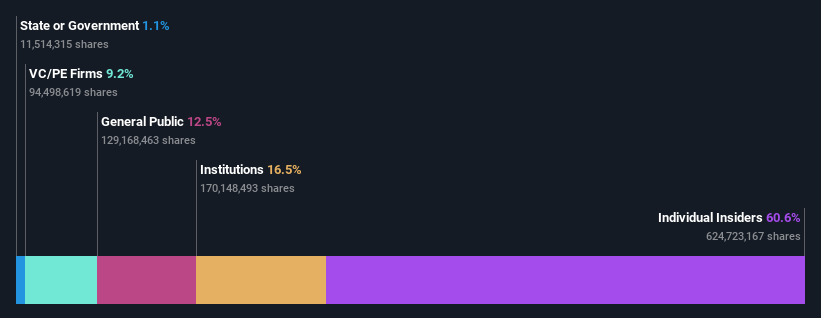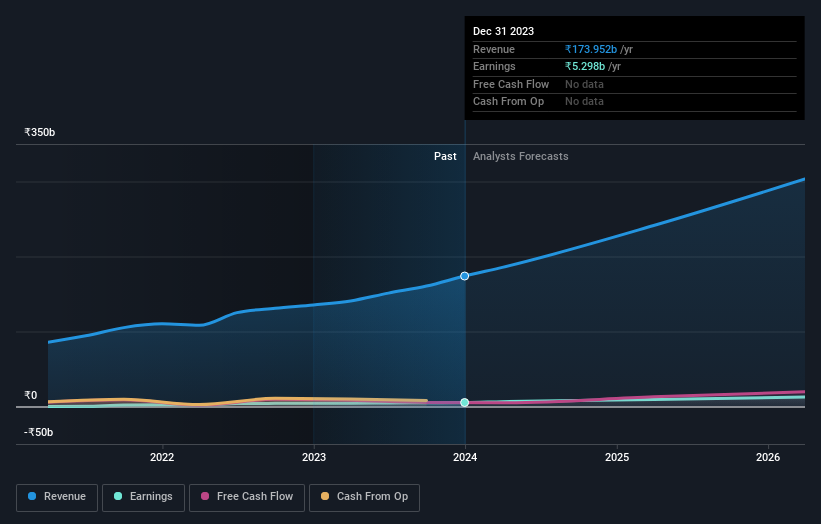Stock Analysis
With 61% ownership, Kalyan Jewellers India Limited (NSE:KALYANKJIL) insiders have a lot at stake

Key Insights
- Insiders appear to have a vested interest in Kalyan Jewellers India's growth, as seen by their sizeable ownership
- The top 3 shareholders own 60% of the company
- 17% of Kalyan Jewellers India is held by Institutions
To get a sense of who is truly in control of Kalyan Jewellers India Limited (NSE:KALYANKJIL), it is important to understand the ownership structure of the business. With 61% stake, individual insiders possess the maximum shares in the company. Put another way, the group faces the maximum upside potential (or downside risk).
So, insiders of Kalyan Jewellers India have a lot at stake and every decision they make on the company’s future is important to them from a financial point of view.
Let's delve deeper into each type of owner of Kalyan Jewellers India, beginning with the chart below.
View our latest analysis for Kalyan Jewellers India

What Does The Institutional Ownership Tell Us About Kalyan Jewellers India?
Institutions typically measure themselves against a benchmark when reporting to their own investors, so they often become more enthusiastic about a stock once it's included in a major index. We would expect most companies to have some institutions on the register, especially if they are growing.
As you can see, institutional investors have a fair amount of stake in Kalyan Jewellers India. This suggests some credibility amongst professional investors. But we can't rely on that fact alone since institutions make bad investments sometimes, just like everyone does. When multiple institutions own a stock, there's always a risk that they are in a 'crowded trade'. When such a trade goes wrong, multiple parties may compete to sell stock fast. This risk is higher in a company without a history of growth. You can see Kalyan Jewellers India's historic earnings and revenue below, but keep in mind there's always more to the story.

Hedge funds don't have many shares in Kalyan Jewellers India. Because actions speak louder than words, we consider it a good sign when insiders own a significant stake in a company. In Kalyan Jewellers India's case, its Senior Key Executive, Seetharama Iyer Kalyanaraman, is the largest shareholder, holding 24% of shares outstanding. The second and third largest shareholders are Ramesh Kalyanaraman and Seetharam Kalyanaraman, with an equal amount of shares to their name at 18%. Note that two of the top three shareholders are also Senior Key Executive and Member of the Board of Directors, respectively, once again pointing to significant ownership by company insiders.
To make our study more interesting, we found that the top 3 shareholders have a majority ownership in the company, meaning that they are powerful enough to influence the decisions of the company.
Researching institutional ownership is a good way to gauge and filter a stock's expected performance. The same can be achieved by studying analyst sentiments. There are plenty of analysts covering the stock, so it might be worth seeing what they are forecasting, too.
Insider Ownership Of Kalyan Jewellers India
While the precise definition of an insider can be subjective, almost everyone considers board members to be insiders. Management ultimately answers to the board. However, it is not uncommon for managers to be executive board members, especially if they are a founder or the CEO.
Most consider insider ownership a positive because it can indicate the board is well aligned with other shareholders. However, on some occasions too much power is concentrated within this group.
Our information suggests that insiders own more than half of Kalyan Jewellers India Limited. This gives them effective control of the company. Given it has a market cap of ₹424b, that means insiders have a whopping ₹257b worth of shares in their own names. It is good to see this level of investment. You can check here to see if those insiders have been selling any of their shares.
General Public Ownership
The general public-- including retail investors -- own 13% stake in the company, and hence can't easily be ignored. While this size of ownership may not be enough to sway a policy decision in their favour, they can still make a collective impact on company policies.
Private Equity Ownership
With an ownership of 9.2%, private equity firms are in a position to play a role in shaping corporate strategy with a focus on value creation. Sometimes we see private equity stick around for the long term, but generally speaking they have a shorter investment horizon and -- as the name suggests -- don't invest in public companies much. After some time they may look to sell and redeploy capital elsewhere.
Next Steps:
While it is well worth considering the different groups that own a company, there are other factors that are even more important. Consider risks, for instance. Every company has them, and we've spotted 1 warning sign for Kalyan Jewellers India you should know about.
If you would prefer discover what analysts are predicting in terms of future growth, do not miss this free report on analyst forecasts.
NB: Figures in this article are calculated using data from the last twelve months, which refer to the 12-month period ending on the last date of the month the financial statement is dated. This may not be consistent with full year annual report figures.
Valuation is complex, but we're helping make it simple.
Find out whether Kalyan Jewellers India is potentially over or undervalued by checking out our comprehensive analysis, which includes fair value estimates, risks and warnings, dividends, insider transactions and financial health.
View the Free AnalysisHave feedback on this article? Concerned about the content? Get in touch with us directly. Alternatively, email editorial-team (at) simplywallst.com.
This article by Simply Wall St is general in nature. We provide commentary based on historical data and analyst forecasts only using an unbiased methodology and our articles are not intended to be financial advice. It does not constitute a recommendation to buy or sell any stock, and does not take account of your objectives, or your financial situation. We aim to bring you long-term focused analysis driven by fundamental data. Note that our analysis may not factor in the latest price-sensitive company announcements or qualitative material. Simply Wall St has no position in any stocks mentioned.
About NSEI:KALYANKJIL
Kalyan Jewellers India
Designs, manufactures, and sells various gold, studded, and other jewelry products.
Exceptional growth potential with adequate balance sheet.


